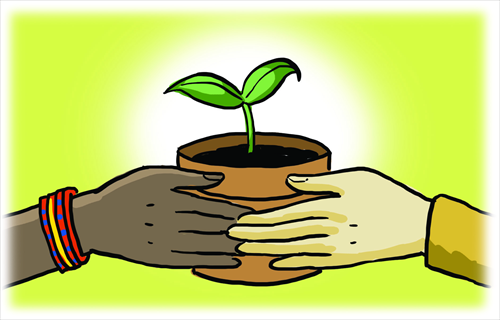HOME >> OP-ED
Beijing's neutrality brings chances on vast continent
Source:Global Times Published: 2014-5-8 22:08:01

Illustration: Liu Rui/GT
Chinese Premier Li Keqiang embarked on his trip to Africa Sunday. Africa is a piece of land that gathers most of the developing countries.
Although there's a long distance between China and Africa, friendly communications between Chinese people and African people have a long history. China has established diplomatic ties with most of the African countries since its founding.
In the past 65 years, the relations between China and Africa are generally amicable.
Political leaderships in China and the African countries have found interests that coincide so that they are able to work together in a friendly manner. This is particularly true in regard to commonalities between China and African states as developing countries.
African leaders expect the top Chinese leaders to come to Africa often. They haven't been disappointed, given the frequency of such visits.
Chinese leaders are leaders in the world in terms of paying visits to African space. Every year one or another Chinese top leader visits Africa.
China does have competitors on this land such as the US, Europe and Japan which eye Africa as a continent rich in resources and full of potentials.
China has provided loans, technologies and personnel that are relevant to Africa's industrialization. So if you compare, for example, the US and China in Africa, China has been involved in many infrastructure projects, some of which are aid and some are businesses.
The US, on the other hand, up until recently has not been involved in infrastructure development or even industrial development outside the oil industry.
The US aid has tended to be related to healthcare in Africa. That helps save people's lives, but it doesn't make a contribution directly to the economic development.
Another advantage is that if there is a decision to be taken, because there are so many State-owned enterprises operating in Africa from China, the decision could be one that is based upon public policy and politics rather than simply on whether or not they are profitable to the property involved.
For example during the financial crisis that began in 2008, Chinese companies ensured that they would not lay off African workers.
Meanwhile, if you look at the attitude of China's representatives in Africa, they work pretty much with every government in power.
When the government comes to power that is on the liberal democratic model, the Chinese government will work with it and will even praise the democratic participation of Africans in their government.
If a non-democratic government comes to power, the Chinese government will also work with that.
It doesn't lay down any particular political condition for working together with the African countries unless the African Union has decided to disfavor a particular government. The Chinese government doesn't make a decision to try to bring about regime change in the African states in contrast to some Western countries.
During Li's four-nation tour, he acknowledged the "growing pains" between China-Africa relations. There have been Western concerns that China is Africa's new colonial overlord.
But those who have such thoughts have no idea what colonization is and simply believe it is exporting raw materials in exchange for manufactured products.
Colonialism is a system of complete political domination and China doesn't politically dominate a single country in Africa.
Also, colonialism involves thoroughgoing racial discrimination at all levels against the local population. Chinese are generally not in a position to racially discriminate against Africans. They have neither the power nor inclination to do that.
The article was compiled by Global Times reporter Wang Wenwen based on an interview with Barry Sautman, an associate professor in the Division of Social Science at the Hong Kong University of Science & Technology. wangwenwen@globaltimes.com.cn
Posted in: Viewpoint